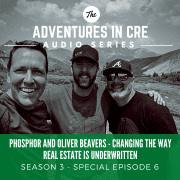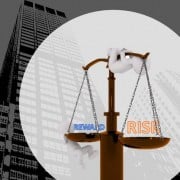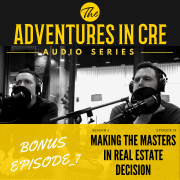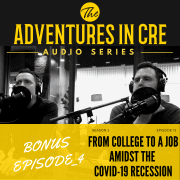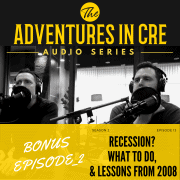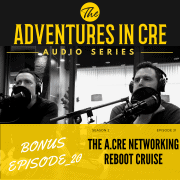Leveraging Data & Technology to Streamline Real Estate Debt Procurement With Yaakov Zar and Sammy Greenwall | S3SP9
In this special episode of the A.CRE Audio Series, we feature Yaakov Zar and Sammy Greenwall, the founders of Lev Capital, a commercial mortgage marketplace for capital market advisors. Spencer, Michael, and Sam speak with Yaakov and Sammy about how Lev is innovating real estate debt procurement technology to modernize the CRE financing process. Through their platform, and by utilizing data and technology, Lev Capital is streamlining this often cumbersome process in a new way.
Watch, listen, or read below to learn about Lev Capital, their efforts to invent new technologies and innovate real estate capital transactions, and their plans for the future.
Leveraging Data & Technology to Streamline Real Estate Debt Procurement
Or Listen to this Episode
Resources from this Episode
Episode Transcript
Announcer (00:01):
Welcome to the Adventures in CRE Audio Series. Join Michael Belasco and Spencer Burton as they pull back the curtain on everything commercial real estate, and introduce you to some of the top minds in the industry. If you want to take your skills to the next level and be part of a growing community of CRE professionals across the world, this is for you.
Sam Carlson (00:25):
Hello, and welcome back to another episode of the Adventures in CRE podcast. We are joined today by Sammy Greenwall and Yaakov Zar with Lev Capital. Now, the last couple episodes, we’ve had maybe two or three of the last episodes where we’re talking with people who are doing interesting things in commercial real estate, but putting technology, taking advantage of new developments and technology. So to kick things off, I’m looking at the Lev Capital website and it says commercial real estate transactions rebuilt. What does that mean? Let’s start there.
Yaakov Zar (01:06):
Yeah, absolutely. So Sam, if you don’t mind, I’ll give a little bit of our background. My name is Yaakov, there’s my co-founder Sammy. We started Lev in 2019 together. My background is in enterprise software. I started a company called Dispatch. We were building tools for home service businesses like plumbers, ultra trans appliance repair companies. We started that business in 2013 and grew it. And in 2018, we sold it to a company called Vista Equity Partners, which is a private equity shop that buys software companies. And while we were running that business, my wife and I were living in Boston and we wanted to buy an apartment. And we went through the whole process of first-time home buyer program, which you guys might be familiar with. There’s all these like incentives. You could buy a house with 5% down, which we thought was pretty cool.
Yaakov Zar (01:53):
And we were a couple of weeks away from closing on our mortgage and the mortgage guy calls me. He’s like, “I’m sorry, your building was rejected by the FHA because of some issue with the roof.” And I’m like… I’ll use expletives that I will spare your listeners from. And I thought, “That’s crazy.” That’s insane that’s the experience that I have so close to the end of the process. And I thought I’ll channel my frustration and we should rebuild the way that mortgages work. It shouldn’t be that you find out things towards the end and it’s all these back and forth and manual processes. So I took classes, I became a licensed mortgage loan originator in Massachusetts, and I wanted to start an online residential mortgage company.
Yaakov Zar (02:35):
I didn’t know the difference between residential, commercial, that all was not anything in my mind. And things were just way too busy with Dispatch. And I like to say that I’m not as capable as Elon Musk of running four companies at a time, so I put this on the back burner for a little bit. And then my wife and I moved back to New York where we’re both from, and I helped a nonprofit that we’re very close with to refinance their building. So they have a building here in the city and their loan was coming due and they needed a new loan. So I raised my hand. I’m like, I know about mortgages a little bit. And I thought, I was an expert and went through the whole process and getting them a commercial mortgage for $4.5 million dollars, which in the world of CRA, as you guys know, it’s not a huge loan.
Yaakov Zar (03:21):
And I called one of my friends that works at a local mortgage brokerage and commercial mortgage brokerage. And we went through the process and it took about six months to get this $4.5 million loan. Hundreds and hundreds of emails. Zero visibility into anything of, what this process should look like. And I thought that was pretty painful. So after I wrapped up my time at Dispatch, I was looking back at the mortgage space and I realized that the pain I had initially with residential mortgages is nothing compared to the pain in commercial mortgages. And I looked around a little bit and I’d met Sammy through… My wife is friends with his sister, and he was working at Toll Brothers at the time doing capital markets for them. And we sort of started talking about what it should look like for commercial real estate transactions. And we started working on Lev in 2019. We didn’t at all answer your question of what we’re trying to do, but we’re about to.
Spencer Burton (04:19):
Well, this is interesting to me because I didn’t know Yaakov and Sam. I didn’t know the background. What you guys have built, and call it two years, is pretty impressive. Go from Toll Brothers, go from an entirely different industry where you’re largely new to what it means to originate a commercial or residential mortgage. How have you guys been able to grow to the degree you have over the last three years? Tell us the story from 2019 to today, because I had no idea that you guys were at that place in 2019, and now where you are today, it’s pretty phenomenal. So kind of walk us through the last couple of years.
Sammy Greenwall (05:01):
I would say it’s definitely an iterative process. That’s for sure. Started with rolling up our sleeves. I had come from an institutional background doing a $150, $200, $250 million deals. Now we were trying to get our first deal done. I remember it was in Concord, North Carolina was a $1.8 million warehouse. And we’re literally calling these local banks trying to figure out the process, how they work, how their approvals work, how to get the pricing done. I’m flying out to get this deal done. There was a doctor in Southern California. Yaakov had me fly out to LA four times to get a $10,000 fee done. Because you have to start from the beginning. You have to start from phase one. You have to start from the traditional space. That’s how you learn how to innovate. And I think the reason that Yaakov and I work well together and I’m able to scale is Yaakov brings this tech mindset and scalability mindset.
Sammy Greenwall (05:52):
So you sort of break every component of that financing process apart and you learn how to adapt and you learn how to be more efficient and quicker and more nimble. And then you learn how to put the tech stack, which is by far the most important part, Yaakov has overseen and built to make that process better and better and better. So we went from those first small, small, small loans to getting a little bit bigger, to having a better and better value pitch, to understanding the lenders a lot, lot better. And then ultimately to closing more quickly and giving our borrowers, our customers an incredible experience through the technology leverage, which Yaakov will speak more about. And on top of that, being a technology company, having incredible investment partners on the venture side to help us scale and build and continue to iterate.
Sam Carlson (06:33):
I think it’s funny because that’s probably where we should have started, right? That ramping up process, the story, the context, the background, and then we could have dovetailed into, okay, that’s obviously a big problem. You guys framed it out beautifully, which I have some background in the residential mortgage space. By the way, I owned a mortgage brokerage and so I know the pain you’re talking about and have been involved in some of those uncomfortable conversations. “No, it wasn’t me. It wasn’t me.” And then, talking with Michael and Spencer, I’ve never originated a commercial loan, but I can only imagine the deal size and the pain involved. And I love that you took the road less traveled. A lot of people want to skip past all the dirt, all the stuff that nobody really loves to do, but you guys went through that. So going through that, and obviously you’re… You said it was an iterative process. That iteration hasn’t stopped I’m guessing, that never really does. But where are we today? You’re remaking these transactions. How far have you come? What can you tell us about that?
Yaakov Zar (07:50):
Sure. Yeah. Our focus has really been on being able to bring as much of the financing process online as possible. So there’s a couple of different components to it. One is customer acquisition and both getting in front of the right people and making it easy for them to communicate all the information about their deal to us. So things like having them submit their deal request online and submit all the information about the deal, et cetera. Two is, identifying the right lender for the deal. So that includes a lot of work that we’ve done around what we call our lender analysis. So when we get a new transaction from someone, from a client, we gather a bunch of information about the deal, and we compare that with thousands of lender profiles, with millions of different data points that we’ve been able to build out.
Yaakov Zar (08:36):
And that uses historical transaction data that lenders have done. It uses real-time feedback that lenders are giving us, sort of about their different programs. And then also the actual transactions that we work with them on. So every time we get terms from a lender, we understand better and better what each lender likes to lend on and we can make sure we get the right deals to the right lender. So we have the intake of transactions, identifying the right lender, and then actually processing and closing that transaction. So the whole due diligence process, document management deal room, et cetera, bringing that all online. So that’s been our focus for the past few years.
Sam Carlson (09:13):
So I have one more follow-up question. And so if you were to take somebody out there who originates commercial loans or deals on that side traditionally without what you guys have been able to create compared to what you do, how would you compare those two today? Are we just saving a… I’m guessing we’re saving time and money?
Yaakov Zar (09:37):
Sure. So I don’t want to say anything negative about people who’ve built amazing careers in commercial real estate finance, and I’m sure there’s a lot of amazing brokers and advisors out there. Our focus has been on being able to get the best lender matched and providing the best experience to the borrower. So we want to get the right terms for the borrower on every single transaction, which is, as you guys know, incredibly complex of what that specific sponsor’s background is, what the profile of that property is, what their business plan on that asset is. And then also being able to create the absolute best experience, which means giving them visibility into what’s going on, predictability, making sure that you deliver on what you promised, not re-trading. And these are things that are common in commercial real estate in many industries. And we want to be able to bring that predictability and visibility there. You’re not getting in an Uber committing to one price, and then once you are halfway there, they’re like, “Yo. By the way, actually, it’s double that.” So we think that experience shouldn’t exist in commercial real estate either.
Sammy Greenwall (10:42):
So two of our north star metrics that KPIs that we’re tracking 2022, the things that we talk about and obsess over every day is matching the expectations before we even take the deal on with what the final deal terms will be, and having that an extremely high clip rate over 90%. And then secondly, ensuring that once those terms are met, the deal is closed a hundred percent of the time. Just to give you industry norms, the expectation setting in the industry, and this is very ballpark, anecdotal, is probably somewhere between 15% and at the top 40%. So we’re two to two and a half times higher than that, at least right now. And then the percentage of actually closing the transaction from a signed term sheet is also significantly lower than where we’re at right now. So those are two ways that we’ve improved through the leveraging of technology in our process.
Spencer Burton (11:30):
How are those… I’m sorry Mike, I know you have…
Sam Carlson (11:32):
Poor Michael.
Michael Belasco (11:34):
They actually answered a lot through that.
Spencer Burton (11:36):
Yeah, I know. So Sammy, how are those expectations set up front? Right? So you’re saying clients have some expectations. Are you guiding clients of those expectations or are they coming to you saying, this is what we expect, and you try and do to accomplish that?
Sammy Greenwall (11:49):
We take in the deal first. So we take in the deal and we analyze it through our system. Then we take the, Yaakov had mentioned the millions, literally millions of lender data points that we have. Everything from rate, whether the sponsor is in the location or not of the location of the asset, because that actually affects pricing and so forth. And we rank all those data points. And then we’re able to come to a thesis-driven conclusion on where the deal is going to pencil out, based off of that ranking. And then we feed that back to the line, the sponsor. And what happens for 99% of the time, is the sponsor, we take them through the exercise, we show them the analysis. We show them how we got to the conclusion. They say, “Even if my terms were different, or even if I have these expectations, I actually understand. You guys have proven to me what the market looks like.”
Sammy Greenwall (12:29):
A traditional broker doesn’t have that ability. They don’t have the data, they don’t have the insight. They don’t have the perspective, they haven’t done the legwork. They don’t have the technology, can’t do without the technology. And that’s the difference in our process, being able to expectation set. And the beauty of that is that once you actually take on the deal and you take it to market, and you line those expectations up, as Yaakov said, you’re not getting in the Uber at $12 and you get out and it’s $17. Still $12 and you get to the final location.
Sam Carlson (12:51):
It’s a big deal.
Sammy Greenwall (12:52):
That part about it.
Michael Belasco (12:55):
All right. So my question has changed actually, because you guys have actually answered a lot of what was going to be my question from the lender perspective. Scalability. Where are you guys today? What bottlenecks, because this is a tech platform, but it sounds like there’s a lot of still person to person communication, right? You’re using the database to comb through opportunities, but it sounds very much like you guys are going out and getting on the phone still and making those contacts. So where are you guys today in terms of volume? What are your plans, growth this year, in the future? Speak a little bit towards that in terms of just potential bottlenecks in your scalability as well.
Yaakov Zar (13:34):
Absolutely. Yeah. In 2020, our first… We started the business at the end of 2019. In 2020, we did about $100 million of loans. In 2021, we did about a $1 billion of loans. This year so far, we’re already at $1 billion, or over billion?
Sammy Greenwall (13:50):
Over $1 billion.
Yaakov Zar (13:51):
Over $1 billion this year so far. So we’ve been growing a lot. We’ve also been growing our headcount. But the metrics that Sammy was mentioning, some of the things that we look really closely at are customer experience, getting the best terms for them. And then also hours per transaction, and we’ve seen that declined by over 50% in terms of the human work that’s involved while the terms that we’re getting are continually getting better. And the business is inherently human. The transaction is physical, and especially in commercial real estate, as you guys well know, people are not as confident in technology to just do things for them.
Yaakov Zar (14:36):
And these are big transactions. So they deserve… You can justify that sort of attention that every deal deserves, but we’ve automated a tremendous amount of the process, and we’re well on our way to automating the remainder and really the way that we look at it is, we should be able to leverage a single platform for handling the end to end transaction. Humans should be involved in overseeing it, but they should never be the bottleneck or the process that’s required for the deal. So to the extent that you want to, no one wants to have to sort through bank statements and print them out and fax them to some guy, right? So you can easily digitize that and create a seamless experience there. So that’s really been our focus.
Spencer Burton (15:26):
Who do you guys see as your customer? Is it the lender? Is it the borrower or is it both? And then what does your typical customer look like?
Yaakov Zar (15:35):
Sure. You mind if I answer?
Spencer Burton (15:36):
Please.
Yaakov Zar (15:38):
Our customer is… We’re a marketplace. So both sides of the marketplace are incredibly important to us, and we invest a lot of time and energy both on the lender side and on the borrower sponsor side. Our customer is the borrower, the client who is looking for financing is our customer and that’s who we are here to serve. We work incredibly closely with lenders. We have programs dedicated to helping us engage lenders and do more with them, but our focus and dedication is to the borrower and that person that needs financing. And 100% of the time, if we have to make a decision, it’s with the focus on the borrower. And we’ve built our whole organization with that deep focus on the customer and our customers are typically sort of middle market investors who are pretty active, not quite institutional, where they have an internal financing team that just handles their transactions, but they’re doing a few transactions a year and they really look to us as their partners, as their financing partners to be able to think through, what are the different scenarios.
Yaakov Zar (16:38):
And we’re really excited to be able to offer them amazing service and also tools to help them build their business.
Spencer Burton (16:43):
Property type? Again, do the customer piece? Are you doing a lot of multi-family agency stuff or are you getting into office retail, industrial, which are a bit more complex?
Sammy Greenwall (16:54):
Did you hear about our deal today that we signed up?
Yaakov Zar (16:57):
No.
Sammy Greenwall (16:57):
We signed up the tallest office building in Shreveport, Louisiana. It’s a $6 million loan. And the reason we did that, it’s the testament to the lender analysis. You mentioned conduit and agency financing. It’s pretty commoditized. What really separates the lender analysis from a traditional brokerage is that we have the nuances of local banks and regional banks and national banks that are able to offer extremely unique product. For example, this deal that I mentioned in Shreveport, it’s from a bank that is regional. They’re offering a non-recourse product, which is very atypical for bank financing. And they’re able to do this with a sponsor who’s out of state, which is also a big point. Most local banks do not like to work with sponsors who are out of state.
Sammy Greenwall (17:36):
So that’s again a testament to our technology and that lender analysis where a traditional mortgage broker, they could spend literally thousands of hours and they likely would never have found that lender, no matter how hard or diligently they were. We were able to leverage the technology, to find that bank that was able to do that deal and execute. But yeah, we do everything. We do do life insurance. We do do some agency, but the vast majority is focused on that bank execution that I been mentioned.
Michael Belasco (18:01):
So from the customer side, one of the things I love is when you start to get to know a really good broker and you have a lot of opportunities. You get that one on one time with them where you sit down, you talk about the business plan. You bounce off the idea, you get feedback and you get this sort of iterative process. Now, whether this is a development or you’re just going to market, there’s somewhat of a business planning and strategy. Now, not everybody gets that, but I’ve met a couple brokers, throughout my career.
Spencer Burton (18:30):
They’re an advisor. Yeah.
Michael Belasco (18:31):
They’re advisor, exactly. To what extent do you guys get involved in that space where people come and they submit deals to you? Is it more just transaction? And you guys are very focused on customer-centric changing the transaction space, but do customers get assigned people that they get to interact with, bounce their business plan off of, get that advisory, that advisory touch I’d call it from the brokerage?
Yaakov Zar (18:57):
It’s huge, yeah. I think that is exactly why we feel like it’s so important to build the tools to handle all of the other things, right? We were working on a priorities project yesterday and the thing that we put on the list is the only thing that our humans should be spending their time on is in sitting with their clients and providing them with that love and attention and service. And the fact that they’re handling more transactions, typically, if you go to a traditional brokerage shop and you talk to the main producer on the team, right? They’re usually pyramid-type structures. There’s the main guy and there’s a bunch of analysts and other guys. He or she. And you end up not getting enough face time with the person who might really know what’s going on because there’s just too much going on.
Yaakov Zar (19:55):
Our focus has been, can we build that scale, right? And give the information that an amazing advisor and partner would need to our team members, without having to build that whole empire of other people doing the support work and have that be technology. So, in fact, what I think and what I believe we’ve achieved at this point is that our team can sit down. If you’re a sponsor, you could sit down with the account manager that you work with, and they have dashboards about the current market state. They have dashboards about your portfolio. They have dashboards about similar properties. They have such deep insight. They have scenario analyses that we’re able to do on different properties. They have such deep insight into what’s going on in the market and they can provide you with so much more complete support and advisory.
Yaakov Zar (20:48):
And I think that’s what’s really special, because if I was a commercial real estate investor and I was running my own shop with a couple of people, I don’t have the time. I don’t have the visibility. I don’t have the hundreds of thousands of dollars to spend on different data products and analysts, et cetera, to tell me that those pieces of information. And you think that’s what…
Michael Belasco (21:06):
Yeah. So basically no matter who’s there, the data is sound. The more you have the data, it’s like anybody can open that dashboard and get that…
Sam Carlson (21:15):
What’s really interesting is, so I remember when I started my career as a loan originator, a residential loan originator, and I worked at M&T Bank actually. It was my first job at M&T Bank. And I went in my first day, I think I was 25 maybe, something like 24, 25. This young guy. Yeah. I was young. I can’t even remember. I walked in and I said, “Hey, I’m here. Where’s my training?” And they’re like, “Oh, we don’t have a training program.” She hands me, the manager Julie, hands me this big old binder. Says, “Here you go.” And so I sit down and for a month, all I did was read guidelines of all these programs. Now that was painful. But what was really insightful was at the end of that month, I knew all of these guidelines. I knew, I don’t know how many programs were in there, hundreds, but I got out there, I’m like, “All right, let’s go get some clients.”
Sam Carlson (22:09):
And I started working with people and I’m like, “Oh yeah, I can help you. Oh, I can help you.” And what was really interesting was I would go and talk to the other originators at that brokerage. And I would be like, “Hey, do you know…” We’d be talking about programs. “Well, why don’t you use that Alt. A program that we’ve got?” They’re like, “What Alt. A program?” I’m like, “The one that’s in the binder. The one… Don’t you know the binder? The binder? You guys… Did… Was I the only one that got the binder?”
Sam Carlson (22:37):
Well, I became like this, it was kind of funny, I got a plaque. The guy from Baltimore flew down, gave me a plaque. And I did like all of these transactions in a month, and everybody was looking at me like I knew all this stuff, but it was just because I could take a person and instead of funneling them into a conventional mortgage, which was what… Everybody would either say, “Okay, you’re conventional, you’re FHA.” That’s it. And I’d be like, “Nah, I got this, I got that.” And I would put people which would give me a slight edge over everybody else in the office. And they were so blown away and they’d come ask me questions. I’m like, “I’ve been doing this for three months.”
Yaakov Zar (23:20):
I know we’re tight on time, but I have a interesting story on that point. If I may, early on in the business, it was super early. I think this was in the depths of COVID. I got a… Or after the first wave in the late summer, I was invited by the CEO of a pretty big brokerage shop for a conversation, just like he’d heard about what we’re doing, and I go in to meet with them. And I explain our business and he’s leader in the industry. I have a lot of respect for him and for the business that they’ve built, but we’re having conversation, I’m explaining the technology we built and I’m explaining that we store all the loan programs and we get every piece of feedback that lenders give and build it into a single database.
Yaakov Zar (24:00):
And he’s like, “Well, I have all that in my head.” And I’m like, “Exactly. That is exactly the… If I had your brain stored on AWS as servers in the cloud somewhere, and I can plug in all of my people and feed more and more data into there, that is what we want to build. And that’s why you might want to work with, on certain transactions, you want to work with the top broker in certain firms, because they have some level of visibility. But any human is not able to compile all of the data-
Sam Carlson (24:34):
That’s awesome.
Yaakov Zar (24:34):
… That is necessary. So hopefully…
Sam Carlson (24:35):
That’s awesome. Well, like you say, we’re short on time. Let’s go ahead and summarize. This has been awesome. I think what you guys have built is really cool. I see the direct application. I can’t wait to see where it goes, because I think you said you’re two years? Three years into this? And you’re crushing it. So, the future looks pretty bright. Head over to levcapital.com. I headed over there while we were on this call just to kind of check it out, and I started thinking, “This is… I know what these guys do. I had this same experience.” So I see what you’re doing and I see the benefit. So it’s awesome, it’s great what you guys have created, and thanks for coming. Appreciate you guys. And to the watchers, readers, listeners, we’ll see you on the next episode.
Announcer (25:20):
Thanks for tuning into this episode of the Adventures and CRE Audio Series. For show notes and additional resources, head over to www.adventuresandcre.com/audioseries. Would you like to learn real estate financial modeling in a matter of weeks and do it with zero guesswork? If so, the A.CRE accelerator is for you. The accelerator is a step-by-step case-based program designed to teach you exactly what you need to know, and in the order you need to know it. So you can gain both the knowledge and experience to take your career to the next level. To see if the accelerator is right for you, go to www.adventuresandcre.com/accelerator.
Frequently Asked Questions about Leveraging Data & Technology to Streamline Real Estate Debt Procurement

